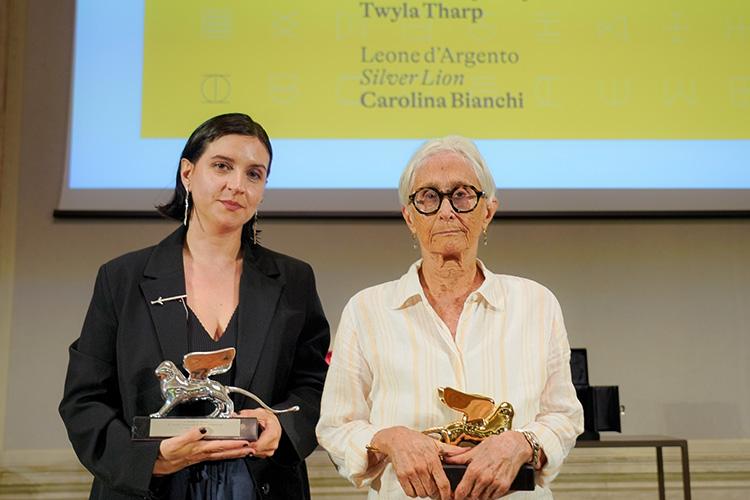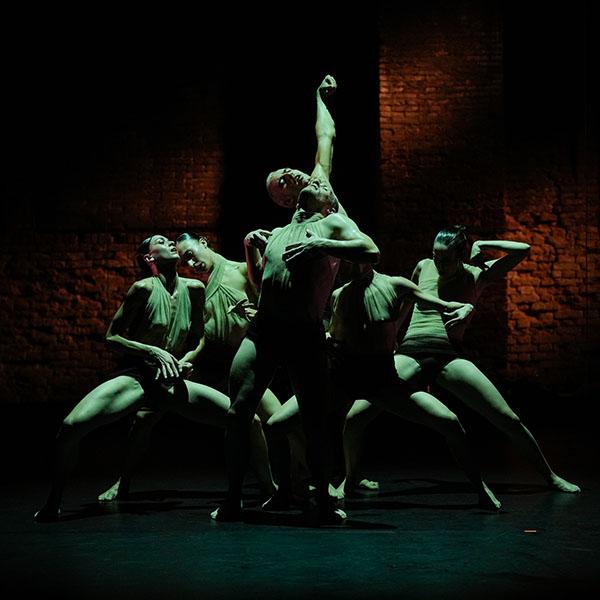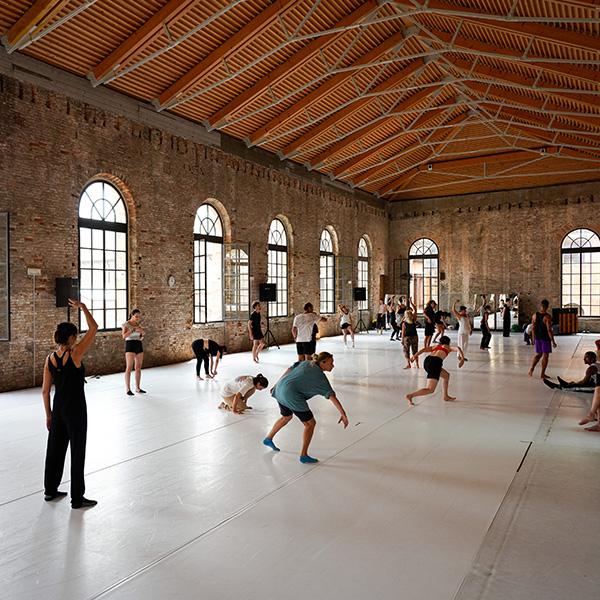
The 2025 Lion awards for Dance
The Golden Lion for Lifetime Achievement goes to the American choreographer Twyla Tharp. The Brazilian performer, author and director Carolina Bianchi received the Silver Lion.
The awards
Twyla Tharp, the legendary American choreographer who throughout her sixty-year career has passed through eras and styles making history along the way, is the Golden Lion of Biennale Danza 2025. The Brazilian performer, author and director Carolina Bianchi, who centres her work on the radical experience of the body, is the winner of the Silver Lion.
The Lions, approved by the Board of Directors of La Biennale di Venezia at the recommendation of the artistic director Wayne McGregor, were awarded on July 19th during the 19th International Festival of Contemporary Dance, which takes place in Venice from July 17th to August 2nd.
Twyla Tharp
Golden Lion for Lifetime Achievement
Raised at the school of the American Ballet Theatre and then in the studios of Martha Graham and Merce Cunningham, and training for a short time with Paul Taylor, Twyla Tharp founded her own company in 1965. Since then, with her dance, Twyla Tharp has liberated bodies and minds from conventions and stereotypes, moving with experimental audacity through all the genres – from tap to jazz dance, from post-modern to neoclassical – and reinventing her original style at each step with remarkable combinatorial skill.
There is no form of performance that Twyla Tharp has not turned her attention to, leaving her own distinctive artistic mark: from the temples of dance, becoming part of the repertory of the major international companies (among the many: Joffrey Ballet, American Ballet Theater, Paris Opera Ballet, Royal Ballet, New York City Ballet, Boston Ballet, Martha Graham Dance Company), to the world of cinema (one in particular: Hair by Milos Forman) and musicals (for example reinventing the most classic of the classics, Singin’ in the Rain), as well as video, pop and rock (with Frank Sinatra, Billy Joel, David Byrne), and finally fashion and television, collecting awards and success (a Tony Award and two Emmy Awards, among others), beloved by the public, critics and artists such as Baryshnikov”.
As Wayne McGregor writes in his motivation: “Twyla Tharp is nothing short of a phenomenon. Her revolutionary contributions to the global dance ecology are unrivalled by her work that combines rigour and play, classical discipline, and ballet technique with modern dance and natural movements, as well as radically innovative choreography for stage and film. Twyla Tharp is one of the most important choreographers alive”.
Twyla Tharp will inaugurate Biennale Danza Thursday July 17th at the Teatro Malibran (with a repeat performance on July 18th) with the European premiere of a diptych that celebrates the sixtieth anniversary of her company (Diamond Jubilee Tour), and which will depart on a long tour of the United States on January 26th, starting from Minneapolis. Twyla Tharp Dance will perform Diabelli, the celebrated choreography created in 1998 to the 33 variations by Beethoven, and Slacktide, the new creation on Aguas da Amazonia by Philip Glass, a composer with whom Tharp has had a long-standing collaboration.
In Venice, Twyla Tharp will also be a mentor for the 16 dancers and 2 choreographers who will be selected for the 2025 edition of Biennale College.
Carolina Bianchi
Silver Lion
A leading figure on the experimental scene in South America, Carolina Bianchi settled in Amsterdam in 2020 and three years later became a sensation at the Avignon Festival with A Noiva e o Boa Noite Cinderela (The Bride and the Goodnight Cinderella), the first chapter in the trilogy titled Cadela Força (Bitch Strength in Portuguese). The show received warm acclaim from audiences and overwhelming praise from critics. It was awarded as “Best Foreign premiere of the 2023/24” season in France, selected by the Le Prix du Syndicat de la Critique.
As Wayne McGregor states in the motivation: “A leading figure in the experimental scene across South America and internationally, Carolina Bianchi is a performer, director, writer, and image maker extraordinaire, who often utilises the body as a central element in her work, creating highly personal, visceral, and choreographic experiences that touch and challenge us. Bianchi frequently explores gender-based violence by risking her own body through both physical and psychological challenges, firmly grounding herself in the tradition of female performance art while also critiquing it. She is pioneering new frontiers in this field. In 2023, Bianchi premiered the first chapter of her trilogy: The Bride and the Goodnight Cinderella, delving into the profound horrors of sexist violence, akin to a descent into the deepest realms of hell, immersing us into a space where memories intertwine and become indistinct. As she evolves her sensationalist trilogy of works, Bianchi remains at the cutting edge of radical performance, reminding us of the essential need for such uncompromising, brave and compassionate new artistic voices”.
The founder and leader of the multidisciplinary collective Cara de Cavalo from Sao Paolo in Brazil, Carolina Bianchi is the author of five productions: the Trilogy Cadela Força (2023/2027), O Tremor Magnifico (2020), Quiero hacer el amor (2017), Mata-me de Prazer (2015) and the short film Isolda (2021).
At Biennale Danza, Carolina Bianchi will present the Italian premiere of the second chapter of the trilogy Cadela Força: The Brotherhood. A work that centres on masculinity and the male gaze, The Brotherhood will be performed at the Teatro delle Tese on Friday the 18rd and Saturday 19th of July.
The awardees of the previous editions
In the past the Golden Lion for Lifetime Achievement in Dance has been awarded to Merce Cunningham (1995), Carolyn Carlson (2006), Pina Bausch (2007), Jirí Kylián (2008), William Forsythe (2010), Sylvie Guillem (2012), Steve Paxton (2014), Anne Teresa De Keersmaeker (2015); Maguy Marin (2016); Lucinda Childs (2017); Meg Stuart (2018), Alessandro Sciarroni (2019), La Ribot (2020), Germaine Acogny (2021), Sabuto Teshigawara (2022), Simone Forti (2023), and Cristina Caprioli (2024).
The Silver Lion, dedicated to promising young artists in dance, or to the institutions that have distinguished themselves for cultivating new talents, has been awarded in the past to Anne Teresa De Keersmaeker's Performing Arts Research and Training Studios (2010), to Michele Di Stefano (2014), to Dana Michel (2017), Marlene Monteiro Freitas (2018), Steven Michel and Théo Mercier (2019), Claudia Castellucci (2020), Oona Doherty (2021), Rocío Molina (2022), Tao Dance Theater (2023), and Trajal Harell (2024).
Biographical notes
 Twyla Tharp (Portland – Indiana, USA, 1941) is an American choreographer. Since graduating from Barnard College in 1963, Twyla Tharp has choreographed more than 160 works: 129 dances, 12 television specials, 6 Hollywood movies, 4 full-length ballets, 4 Broadway shows and 2 figure skating routines. She received one Tony Award, two Emmy Awards, nineteen honorary doctorates, the Vietnam Veterans of America President's Award, the 2004 National Medal of the Arts, the 2008 Jerome Robbins Prize, and a 2008 Kennedy Center Honor. Her many grants include the John D. and Catherine T. MacArthur Fellowship. She is a member of the American Academy of Arts and Sciences, the American Philosophical Society, and an Honorary Member of the American Academy of Arts and Letters.
Twyla Tharp (Portland – Indiana, USA, 1941) is an American choreographer. Since graduating from Barnard College in 1963, Twyla Tharp has choreographed more than 160 works: 129 dances, 12 television specials, 6 Hollywood movies, 4 full-length ballets, 4 Broadway shows and 2 figure skating routines. She received one Tony Award, two Emmy Awards, nineteen honorary doctorates, the Vietnam Veterans of America President's Award, the 2004 National Medal of the Arts, the 2008 Jerome Robbins Prize, and a 2008 Kennedy Center Honor. Her many grants include the John D. and Catherine T. MacArthur Fellowship. She is a member of the American Academy of Arts and Sciences, the American Philosophical Society, and an Honorary Member of the American Academy of Arts and Letters.
In 1965, Ms. Tharp founded her dance company, Twyla Tharp Dance. Her dances are known for creativity, wit and technical precision coupled with a streetwise nonchalance. By combining different forms of movement – such as jazz, ballet, boxing and inventions of her own making – Twyla Tharp’s work expands the boundaries of ballet and modern dance.
In addition to choreographing for her own company, she has created dances for The Joffrey Ballet, American Ballet Theatre, The Paris Opera Ballet, The Royal Ballet, New York City Ballet, The Boston Ballet, The Australian Ballet, Hubbard Street Dance Chicago, The Martha Graham Dance Company, Miami City Ballet, Pacific Northwest Ballet, Atlanta Ballet and Royal Winnipeg Ballet. Today, ballet and dance companies around the world continue to perform Twyla Tharp’s works.
Twyla Tharp's work first appeared on Broadway in 1980 with When We Were Wery Young, followed by her collaboration with musician David Byrne on The Catherine Wheel and later by Singin’ in the Rain. In 2002, she created the dance musical Movin’ Out, set to the music and lyrics of Billy Joel. She Tharp later worked with Bob Dylan’s music and lyrics in The Times They Are A-Changin’ and Come Fly Away, set to songs sung by Frank Sinatra.
In film, Twyla Tharp has collaborated with director Milos Forman on Hair, Ragtime and Amadeus. She has also worked with Taylor Hackford on White Nights and James Brooks on I’ll Do Anything.
Her television credits include choreographing Sue’s Leg for the inaugural episode of PBS' Dance in America in 1976, co-producing and directing Making Television Dance, and directing The Catherine Wheel for BBC Television. Twyla Tharp co-directed the television special Baryshnikov by Tharp.
In 1992, she published her autobiography Push Comes to Shove. She went on to write The Creative Habit: Learn it and Use it for Life, followed by The Collaborative Habit: Life Lessons for Working Together. In 2019, her fourth book was published, Keep it Moving: Lessons for the Rest of Your Life.
Today, Twyla Tharp continues to create on stages around the world.
 Carolina Bianchi (Porto Alegre, 1984) is a Brazilian theatre director, writer, and performer currently based in Europe. She has been working in theatre throughout her entire life.
Carolina Bianchi (Porto Alegre, 1984) is a Brazilian theatre director, writer, and performer currently based in Europe. She has been working in theatre throughout her entire life.
Bianchi graduated from the Escola de Arte Dramática at the University of São Paulo, where she lived for fifteen years. During that time, she worked as actress, director, dramaturg, writer, and shared her research in theatre and performance practices with young artists trough workshops. Her work in Brazil was part of the independent scene, meaning that for many years, Carolina and her company operated without subsidies, which, of course, impacted her creations.
While in São Paulo, Carolina Bianchi developed her unique theatrical language, working collectively with various partners from dance, theatre, video, and music. Some of those artists would become constant collaborations, and part of Cara de Cavalo company, with whom she has being working together for more than 10 years.
Since 2015, she directs the collective Cara de Cavalo from São Paulo, with whom she most recently created Trilogia Cadela Força (Cadela Força Trilogy, 2022–27), O Tremor Magnífico (The Magnificent Tremor, 2020), Lobo (Wolf, 2018), and Mata-me de Prazer (Kill Me with Pleasure, 2016).
In 2020, Bianchi moved to Amsterdam for study at Das Arts, a Master in Theatre program. During this time, she began developing a long-term project: a trilogy called Cadela Força, which examines sexual violence (especially rape) and art history across three chapters. After her graduation in 2022, she continued working on the first chapter, The Bride and the Goodnight Cinderella with Cara de Cavalo collective, until its premiere in July 2023 at the Festival d'Avignon.
Since its premiere, the Chapter I: The Bride and the Goodnight Cinderella has toured major festivals and venues across Europe, receiving a warm reception from audiences and critics. The production and Carolina’s work has also been studied by leading universities worldwide, including Giessen University in Germany and Harvard and New York University in the United States.
The show was awarded “Best Foreign Premiere of the 23/24 season” in France by the Le Prix du Syndicat de la Critique. The text The Bride and the Goodnight Cinderella was published by the French publisher Les Solitaires Intempestifs in 2024.
Writing is at the core of her practice as a theatre maker. In her texts, she combines long personal monologues with poetic descriptions of situations on stage. She often channels the voices of other writers—most of them long deceased—with whom she is obsessed with, as if they form a kind of genealogy for her life. Her writing is filled with anguish, constantly seeking words to express the extreme violence of the world, the loneliness, fear, her sexuality, and her obsessions with art and its paradigms.
In her works, the body of the performers always appears as a disturbing presence crossing some kind of extreme journey, full of desire and contradiction, carrying an enigma, as a constant search for another language, another logic that can bring out senses subversive to the order, that allows other forms of relationship between the visible and the mysterious, manifestations of evil, romanticism and art, memories of sexual traumas and desire. Her staging is a combination of references from literature and painting, focusing on violence through text and bodies that incarnates sensory and performative gestures in a constant friction between an exacerbated theatricality and a radical performativity.



